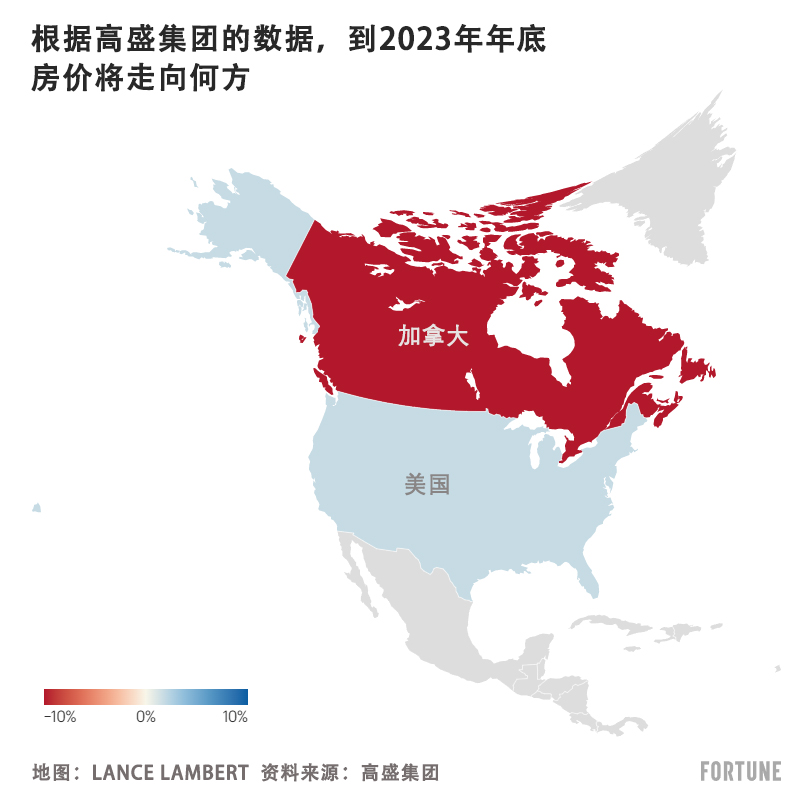
十多年来,发达国家的住宅房地产似乎首次受到价格下跌的影响。在房价出现前所未有的上涨后,当各国央行转而进入加息模式时,就会发生这种情况。
但与2008年房地产泡沫破裂不同的是,美国不会成为这次房地产回调的中心。至少高盛集团(Goldman Sachs)是这么认为的。
今年9月,高盛集团的研究人员发布了《房地产市场低迷:新西兰、澳大利亚和加拿大房地产市场问题更严重》(The housing downturn: A bigger deal down under and up north)的论文。该论文预测,到2023年年底,新西兰(-21%)、澳大利亚(-18%)和加拿大(-13%)的房价将出现崩盘式下跌。相比之下,在美国房地产泡沫期间,房价从2006年的峰值到2012年的谷底下跌了27%。
高盛集团显然把澳大利亚、加拿大和新西兰归入了房地产崩盘(或几乎崩盘)阵营,但它对其他十国集团(G10)国家的房地产市场并不那么悲观。高盛集团的研究人员预测,到2023年年底,法国的房价将下跌6%,而英国的房价将保持不变。与此同时,他们表示,美国房价实际上将在2023年上涨1.8%。

为什么高盛集团对澳大利亚和新西兰等国房地产的悲观程度远超美国?这归结为独立的基本面。虽然美国房价历史上一直存在泡沫,但加拿大等国的房价却高得离谱。仅在2021年,加拿大的房价就飙升了27%,而美国的房价则上涨了18.9%。
高盛集团的研究人员写道:“在整个十国集团中,房屋销售正在迅速下降,房价增长正在放缓,在新冠疫情期间涨幅较大的国家,房价直线下跌。”
尽管如此,研究人员指出,美国一些地区的房地产市场未来很可能会出现房价下跌。是哪些地区的房地产市场呢?高盛集团没有透露。然而,这份名单可能包括博伊西和菲尼克斯这样存在房地产泡沫的城市。
穆迪分析公司(Moody 's Analytics)的另一项分析预测,美国房价要么将保持稳定,要么将从峰值跌至谷底,跌幅最高可达5%。在包括博伊西和夏洛特在内的美国187个被严重“高估”的地区房地产市场中,穆迪分析公司预测房价将下跌5%至10%。但这一情况出现的前提是美国经济不会陷入衰退。穆迪分析公司认为,如果美国经济陷入衰退,美国的房价就将下跌5%至10%,被严重高估的地区房价将下跌15%至20%。

不过,虽然高盛集团和穆迪分析公司等机构没有预测美国房地产市场会崩盘,但这并不意味着房地产市场低迷不会削弱美国整体经济。事实上,由房地产市场低迷引发的经济萎缩已经出现。
上周,高盛集团的研究人员预测,美国房地产市场活动将在2022年和2023年出现全面下滑。该公司预计,今年美国新屋销售(下降22%)、现房销售(下降17%)和住房GDP(下降8.9%)将大幅下降。高盛集团预计,明年美国新屋销售(再下降8%)、现房销售(再下降14%)和住房GDP(再下降9.2%)将进一步下降。
在新西兰、澳大利亚和加拿大等国家,持续的房市修正造成的经济萎缩可能会更加严重。
高盛集团的研究人员写道:“基于对房价的负面展望以及住宅投资和住房财富的重要性,我们发现,房地产市场低迷对新西兰、澳大利亚和加拿大的国内生产总值构成了更大的下行风险。”该投资银行表示,在新西兰,房地产市场低迷很可能会让该国的整体经济陷入衰退。(财富中文网)
译者:中慧言-王芳
十多年来,发达国家的住宅房地产似乎首次受到价格下跌的影响。在房价出现前所未有的上涨后,当各国央行转而进入加息模式时,就会发生这种情况。
但与2008年房地产泡沫破裂不同的是,美国不会成为这次房地产回调的中心。至少高盛集团(Goldman Sachs)是这么认为的。
今年9月,高盛集团的研究人员发布了《房地产市场低迷:新西兰、澳大利亚和加拿大房地产市场问题更严重》(The housing downturn: A bigger deal down under and up north)的论文。该论文预测,到2023年年底,新西兰(-21%)、澳大利亚(-18%)和加拿大(-13%)的房价将出现崩盘式下跌。相比之下,在美国房地产泡沫期间,房价从2006年的峰值到2012年的谷底下跌了27%。
高盛集团显然把澳大利亚、加拿大和新西兰归入了房地产崩盘(或几乎崩盘)阵营,但它对其他十国集团(G10)国家的房地产市场并不那么悲观。高盛集团的研究人员预测,到2023年年底,法国的房价将下跌6%,而英国的房价将保持不变。与此同时,他们表示,美国房价实际上将在2023年上涨1.8%。
为什么高盛集团对澳大利亚和新西兰等国房地产的悲观程度远超美国?这归结为独立的基本面。虽然美国房价历史上一直存在泡沫,但加拿大等国的房价却高得离谱。仅在2021年,加拿大的房价就飙升了27%,而美国的房价则上涨了18.9%。
高盛集团的研究人员写道:“在整个十国集团中,房屋销售正在迅速下降,房价增长正在放缓,在新冠疫情期间涨幅较大的国家,房价直线下跌。”
尽管如此,研究人员指出,美国一些地区的房地产市场未来很可能会出现房价下跌。是哪些地区的房地产市场呢?高盛集团没有透露。然而,这份名单可能包括博伊西和菲尼克斯这样存在房地产泡沫的城市。
穆迪分析公司(Moody 's Analytics)的另一项分析预测,美国房价要么将保持稳定,要么将从峰值跌至谷底,跌幅最高可达5%。在包括博伊西和夏洛特在内的美国187个被严重“高估”的地区房地产市场中,穆迪分析公司预测房价将下跌5%至10%。但这一情况出现的前提是美国经济不会陷入衰退。穆迪分析公司认为,如果美国经济陷入衰退,美国的房价就将下跌5%至10%,被严重高估的地区房价将下跌15%至20%。
不过,虽然高盛集团和穆迪分析公司等机构没有预测美国房地产市场会崩盘,但这并不意味着房地产市场低迷不会削弱美国整体经济。事实上,由房地产市场低迷引发的经济萎缩已经出现。
上周,高盛集团的研究人员预测,美国房地产市场活动将在2022年和2023年出现全面下滑。该公司预计,今年美国新屋销售(下降22%)、现房销售(下降17%)和住房GDP(下降8.9%)将大幅下降。高盛集团预计,明年美国新屋销售(再下降8%)、现房销售(再下降14%)和住房GDP(再下降9.2%)将进一步下降。
在新西兰、澳大利亚和加拿大等国家,持续的房市修正造成的经济萎缩可能会更加严重。
高盛集团的研究人员写道:“基于对房价的负面展望以及住宅投资和住房财富的重要性,我们发现,房地产市场低迷对新西兰、澳大利亚和加拿大的国内生产总值构成了更大的下行风险。”该投资银行表示,在新西兰,房地产市场低迷很可能会让该国的整体经济陷入衰退。
译者:中慧言-王芳
For the first time in over a decade, residential real estate across the developed world appears vulnerable to falling prices. That’s what happens when central banks flip into interest rate hiking mode after an unprecedented run-up in home prices.
But unlike the last time around—the 2008 housing bust—the U.S. won’t be at the epicenter of this housing pullback. At least that’s according to Goldman Sachs.
In September, researchers at Goldman Sachs released “The housing downturn: A bigger deal down under and up north.” Through the end of 2023, the paper predicts a crash-like drop in home prices in New Zealand (–21%), Australia (–18%), and Canada (–13%). For comparison, the U.S. housing bubble saw home prices drop 27% between the 2006 peak and the 2012 bottom.
Goldman Sachs clearly has Australia, Canada, and New Zealand in the housing crash (or almost crash) camp, however it’s less pessimistic about other G10 countries. Through the end of 2023, Goldman Sachs researchers predict that home prices will fall 6% in France and remain unchanged in the United Kingdom. Meanwhile, they say U.S. home prices will actually rise 1.8% in 2023.
Why is Goldman Sachs so much more bearish on countries like Australia and New Zealand than the United States? It boils down to detached fundamentals. While home prices in the U.S. are historically frothy, home prices in countries like Canada are simply off the charts. In 2021 alone, Canadian home prices soared 27% while U.S. home prices climbed a more modest 18.9%.
“Across the G10, home sales are falling quickly and home price growth is slowing, with outright price declines in places that saw the bigger increases during the pandemic,” write Goldman Sachs researchers.
That said, the researchers note some U.S. regional housing markets will very likely see home price declines heading forward. Which markets? Goldman Sachs didn’t say. However, the list probably includes frothy markets like Boise and Phoenix.
A separate analysis by Moody’s Analytics predicts that U.S. home prices will either remain stable or fall as much as 5% from peak to trough. In the nation’s 187 significantly “overvalued” regional housing markets, including Boise and Charlotte, Moody’s predicts home price declines of 5% to 10%. But that assumes no recession. If a recession hits, Moody’s thinks U.S. home prices would fall 5% to 10% and significantly overvalued regional markets would see 15% to 20% drops.
But just because groups like Goldman Sachs and Moody’s Analytics aren’t predicting a housing crash in the U.S., doesn't mean the housing downturn won’t weaken the overall U.S. economy. In fact, the economic contractions caused by housing are already here.
Last week, researchers at Goldman Sachs projected that activity in the U.S. housing market will end 2022 and 2023 down across the board. The firm expects sharp declines this year in U.S. new home sales (a 22% drop), U.S. existing home sales (a 17% drop), and U.S. housing GDP (an 8.9% drop). Goldman Sachs projects further declines next year in U.S. new home sales (another 8% drop), U.S. existing home sales (another 14% drop), and U.S. housing GDP (another 9.2% drop).
The economic contractions caused by the ongoing housing correction could be even more severe in countries like New Zealand, Australia, and Canada.
“Based on this negative outlook for home prices, and the importance of residential investment and housing wealth, we find that the housing downturn poses larger downside risks to GDP in New Zealand, Australia, and Canada,” write the Goldman Sachs researchers. In New Zealand, the investment bank says, it’s likely the housing downturn pulls the country’s overall economy into a recession.






